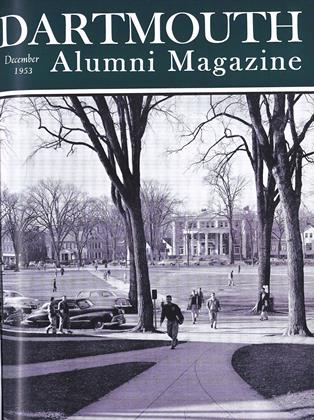ACCORDING to the annual report of the Committee on Admission and the Freshman Year, released last month, the Class of 1957 at Dartmouth shows promise of being one of the best classes ever admitted to the College. In all-around ability it outranks, on paper at least, the last three entering classes and in some respects it has set the best statistical marks yet recorded.
Scholastically, the aptitude score of 19.57, as measured by the American Council Psychological Examination, set an all-time record. Its marks on the College Board Examinations, taken by 99% of the class, were substantially higher than for the previous three classes; although in academic performance as measured by rank in secondary-school, it did not equal the records of the Classes of 1952 and 1953. The present freshman class matriculated with 39 school valedictorians, 35% who ranked in the top tenth of their classes, 68.8% in the top quarter, and 88.9% in the top half.
In extracurricular activities, the men of 1957 also provide some impressive statistics. There are 97 class presidents, 53 student council presidents, 438 singers and instrumentalists (enough Freshman Glee Club candidates to force Professor Zeller into a two-platoon system), 294 actors, 69 interscholastic debaters, and 105 editors-in- chief. The report makes special mention of "the first bagpiper ever statistically recorded here," and goes on to say: "No one requested a bagpiper; in fact, the Music Department, after its period of wistful aspiration for a bassoon player, has not been heard from since the Class of 1955 produced three bassoonists and a resulting strain on the instrumental budget."
In athletics, the men of 1957 won an aggregate of 877 letters in 25 sports, and captained or co-captained 179 teams. An even 200 men won varsity football letters. Concerning these figures on athletic prowess, the report states that they "are offered not only because it is a habit, but also as a defense against those who profess to believe that the first principle of the Selective Process is to exclude those whose legs are strong enough to transport their brains from class to class with comfort."
The average age of the Class of 1957 at matriculation was 18 years and two months. The youngest freshman was 16 and the oldest a married veteran with three children —was 28. Only three veterans are in the class.
The freshmen have been assembled from 438 different schools, 63% of them public and 37% independent. The two largest delegations, 14 men each, are from Phillips Academy (Andover) and Deerfield Academy. Phillips Exeter and Vermont Academy provided ten freshmen each, with other groups of six or more men coming from Scarsdale (N. Y.) High School, Mt. Hermon, New Trier High School, Governor Dummer, Mercersburg, Lawrenceville, and Haverford.
Geographically, the Class of 1957 comes from 41 states, the District of Columbia and fourteen foreign lands. It is 43.4% from the Middle Atlantic States, 27.4% from New England, 16.2% from the Mid West, 5.8% from the Far West, 5.1% from the South, and 2.1% from out of the country. The Southern representation, while still small, is double that of previous years and is the highest ever. The foreign lands represented are Austria, Brazil, Canada, China, Costa Rica, Cuba, Ecuador, Germany, Japan, Korea, Luxembourg, Norway, Spain and Venezuela.
Entering freshmen, by passing proficiency tests, can obtain exemption from certain course requirements. This fall, 64 men won language exemptions, 115 history exemptions, 101 hygiene exemptions, and eight Freshman English exemptions.
The 728 men in the Class of 1957 were selected from 4,017 preliminary and 2,820 completed applications. The number of completed applications was 13% higher than for the year before, indicating, says the report, that Dartmouth is getting more than its proportional share of increased applications throughout the country. The growth of the 18-year-old male population for this year was forecast at 5%. For 1953- 54 the 18-year-old male population is ex- pected to increase only 2.6% but on Octo- ber 1 Dartmouth's application list was 11% higher than on the same date last year. By 1959-60, when the Class of 1964 is being selected, this population group will number 1,365,000, or 31% more than when the Class of 1956 was chosen.
"If the growth in our number of applications continues to outstrip the population increments," says Dartmouth's Committee on Admission and the Freshman Year, "we must by thai time be geared for operations on a much larger scale than any previously experienced."
 View Full Issue
View Full Issue
More From This Issue
-
 Article
ArticleBIGNESS
December 1953 By DAVID E. LILIENTHAL -
 Article
ArticleCharles Ransom Miller '72
December 1953 By JOHN HURD '21 -
 Class Notes
Class Notes1918
December 1953 By ERNEST H. EARLEY, w. CURTIS GLOVER, RICHARD P. WHITE -
 Class Notes
Class Notes1935
December 1953 By HENRY R. BANKART, JOHN WALLACE -
 Class Notes
Class Notes1931
December 1953 By Lambert & Feasley, Inc., PETER B. EVANS, CHARLES S. MCALLISTER -
 Article
ArticleA True Dog Story
December 1953 By A. I. Dickerson







